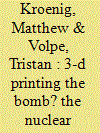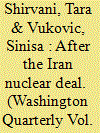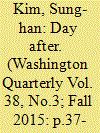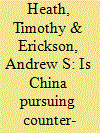| Srl | Item |
| 1 |
ID:
142796


|
|
|
|
|
| Summary/Abstract |
3-D printing will make it easier for countries to acquire nuclear weapons, providing a way to print pieces of the nuclear jigsaw puzzle indigenously before anyone notices. The United States should lead an international effort to prevent this avenue to a cascade of nuclear weapons proliferation before it is too late.
|
|
|
|
|
|
|
|
|
|
|
|
|
|
|
|
| 2 |
ID:
142800


|
|
|
|
|
| Summary/Abstract |
The Iran deal inspires new questions such as why has the agreement come about now? And can the parties create momentum to cooperate on other issues? In Europe's case, the overlooked actor may have been motivated by an overlooked element: potential energy cooperation to help escape Russia's gas monopoly.
|
|
|
|
|
|
|
|
|
|
|
|
|
|
|
|
| 3 |
ID:
142802


|
|
|
|
|
| Summary/Abstract |
The days of Chinese double-digit growth are gone. Yet, the analytical separation of economic matters from strategic and military planning is both surprising and illogical. Beijing's capacity to continue building its military power is diminishing much faster than is commonly appreciated.
|
|
|
|
|
|
|
|
|
|
|
|
|
|
|
|
| 4 |
ID:
142798


|
|
|
|
|
| Summary/Abstract |
Whenever a North Korean regime “contingency” occurs, it would be the right occasion to seek unification of the Korean peninsula. But some advance peacetime strategy and vision is required to manage the security challenges and divergent priorities of all the major players involved.
|
|
|
|
|
|
|
|
|
|
|
|
|
|
|
|
| 5 |
ID:
142799


|
|
|
|
|
| Summary/Abstract |
Iran's policy toward nuclear talks changed not because of Rouhani's election in 2013, but because of Supreme Leader Khamenei in 2011. Yet the future of that agreement, whose significance in Iran is comparable to the 1987 ceasefire with Iraq, depends on continuing political will, which among other issues, could be disrupted by at least three factors inside Iran.
|
|
|
|
|
|
|
|
|
|
|
|
|
|
|
|
| 6 |
ID:
142801


|
|
|
|
|
| Summary/Abstract |
The United States is immersed in its most intense China policy debate in decades, which will almost certainly get more heated and public in 2016. For a variety of reasons, reviewed here, dissatisfaction with China's domestic and international evolution has become widespread as has pessimism about the future of U.S.–China relations, leading to a growing debate over three broad ways to revise U.S. policy.
|
|
|
|
|
|
|
|
|
|
|
|
|
|
|
|
| 7 |
ID:
142804


|
|
|
|
|
| Summary/Abstract |
For decades, China has been countering U.S. naval strengths with asymmetric capabilities, not by matching them. Yet, China is now building aircraft carriers. Why? It is not a sign of strength but rather history is replete with examples, including two from the Cold War, of weaker states imitating more advanced rivals rather than pursuing their own “disruptive” innovations.
|
|
|
|
|
|
|
|
|
|
|
|
|
|
|
|
| 8 |
ID:
142803


|
|
|
|
|
| Summary/Abstract |
The term “counter-invention” has become burdened with conflated meanings and thus controversial in describing aspects of Chinese national and military strategy. Yet, the term should be retained although refined in two ways to help U.S. policymakers and planners devise appropriate responses to Chinese behavior aimed at undermining U.S. leadership in Asia.
|
|
|
|
|
|
|
|
|
|
|
|
|
|
|
|
| 9 |
ID:
142797


|
|
|
|
|
| Summary/Abstract |
The former Clinton administration official unveils progress that North Korea has made on four parallel nuclear and missile initiatives that could soon amount to a survivable, strategic nuclear capability. As a result, it is time for the United States to state unambiguously that it will impose secondary sanctions and resort to pre-emptive military action if Pyongyang performs additional nuclear or missile tests or deploys certain new and threatening military systems.
|
|
|
|
|
|
|
|
|
|
|
|
|
|
|
|